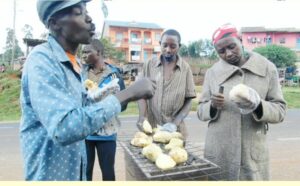By Blaise Gitonga

Yam roasters at Kiracha, Chuka |PHOTO-Gerald Kibaki
Tharaka Nithi County might be known for producing a variety of food products but little is known of the popular yam business in the area. Interestingly, it is a preferred dish for the residents and their neighboring counties, a contrast to what most people believe.
A drive or a walk along the Nairobi-Meru highway at Kiracha, one is likely to spot business sheds of yam sellers. Among them, it’s hard to go past 39-year-old Anthony Kariuki, a famous seller safe to say. As far as he can recall, Anthony has been in the yam business for about 15 years of his life, a business that has seen him raise a family of one child and a wife.
Anthony explains that the business started as a result of their mother’s activities who used to own small houses along the road selling the yams which led to its fame and success in the area. According to Mr. Anthony, the love of yams by the people of Tharaka-Nithi has led to its popularity in the area, a little contrast of what the stereotypic Meru people are thought to love.
On a good business day, Anthony explains that work can start from 8 AM and close at 9 PM with an average earning of about two to three thousand shillings
One of the major problems with the business is competition, the fact that there are many yam sellers here in Kiracha hence a very vigorous competition amongst themselves, the good thing though being that they hardly go without their daily meals Anthony says.
Pointing at one of his products, Anthony gives us his prices. “Yam is very expensive. Take a look at this one here, its market price is two hundred shillings. Bearing in mind that I spend about a hundred and twenty shillings to prepare it for sale my profit is roughly 80 shillings.”
Yam takes at least two years to grow and thrive. With this long duration of harvest, it is curious to know how yam in Kiracha never lacks every day. “We don’t plant the yams ourselves since it takes longer to mature. Plus, we don’t have adequate land and farms to do the planting. Most of the time we buy them from those who plant them. We also sell the seeds at times to those who plant”, he points out.
When asked how he expects to be helped by the government, Anthony says the sellers need capital to boost their businesses. He insists that they only hear that the government gives grants and loans to people who have SME’s but the funds have never reached them
“I would plead with the government to make sure we get these monies as they would go a long way in helping us. I would use the money to get a motorcycle to help me get the yams easily since now I use about seven hundred shillings per trip just to transport the yams from the producer. A motorcycle would go a long way in cutting costs while maximizing my profits.”
Mr. Anthony, who has been in the yam business for 15 years says the business has enabled him to build his own house and pay his child’s school fees.
Kiracha yam sellers have gone a long way in supporting one another. Through their yam selling self-help group which Anthony is the chairman with about twenty-one members, the sellers have other income-generating activities that generate more money though with challenges.




